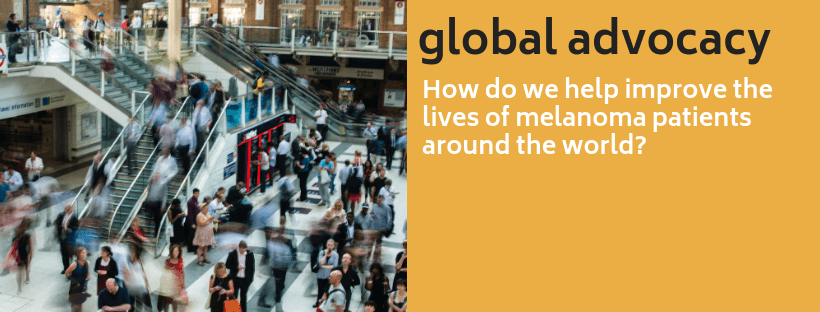Global Advocacy: Progress Report


Melanoma is a global disease. In the United States, one person dies every 54 minutes from melanoma. Australia and New Zealand have the highest melanoma rates in the world, and the disease kills more young Australian 20-39 year-olds than any other single cancer. In Europe, the highest rates belong to Switzerland and Norway—but the incidence rate is increasing all over Europe. In 2017, approximately 7,300 Canadians were newly diagnosed with melanoma, and in 2018 there will be an estimated 6,260 new melanoma cases in Brazil. It adds up to a worldwide need for education, prevention, and research.
In the U.S., in many cancers, patient advocacy groups like AIM at Melanoma play an important role in educating patients and their caregivers/families, pushing for access to clinical trials and drug approvals, raising awareness about a disease, and funding research. Outside of the U.S., however, this work was lacking, because few melanoma patient advocacy groups existed.
To address this unmet need, several years ago AIM recruited a network of collegial, skilled, and supportive global melanoma advocates in order to aid them in their advocacy work. AIM’s support runs the gamut: We fund melanoma website creation; teach social media skills; enable attendance at global melanoma meetings; fund prevention/awareness campaigns; and much more. With this enhanced capacity, AIM’s advocates are better able to support the melanoma communities in their countries. AIM refers to this initiative as the Melanoma International Patient Advocates Coalition (MI-PAC).
As a result of MI-PAC, in 2018 we saw enormous progress in global melanoma advocacy. For example:
~In the United Kingdom, Gill Nuttall, CEO, and Founder at Melanoma UK, was quoted in multiple publications when Tafinlar® (dabrafenib) in combination with Mekinist® was made available for NHS patients in England and Wales as an adjuvant treatment for melanoma patients, recognizing Melanoma UK as an authority on the disease.
~In Brazil, we funded Rebecca Montanheiro, Founder and President of Melanoma Brasil, to attend the World Melanoma Congress—an opportunity never before given to a patient advocate organization—where she shared the patient perspective on the new treatment options for melanoma available in her country and the importance of advocacy work.
~We provided Claudia Piazza Cidonio, Founder of Melanoma LatinoAmerica, the funding for bus and TV advertisements to educate the population on melanoma risk factors.
~In Eastern Europe, we provided the funding for Udruženje pacijenata obolelih od melanoma’s (Serbian Melanoma Patients Association) website created by Stefan Kostic, the first step in the organization’s quest to educate and advocate for all of Eastern Europe.

We provided Melanoma LatinoAmerica the funding for bus and TV advertisements to educate the population on melanoma risk factors.
In 2019, we intend to take another step forward in global advocacy with one specific goal: translation. We know our medical materials and patient support resources are frequently translated online by advocates, physicians, patients, and others through systems such as Google Translate. These machine translations use data over time to produce a statistical equivalent of what the best translation may be, leaving lots of room for error—and it’s even more problematic when what they’re translating includes medical terminology. Translation by humans, trained in one’s target language, is the most accurate system.
AIM’s goal is to have many of our materials professionally translated so they can be utilized by the global melanoma community, including the physicians with whom we work, our army of global advocates, and melanoma patients around the globe.
Look for AIM to continue its global advocacy efforts in 2019, to help raise awareness, educate, provide access to treatments, and fund research so that we can rid this world of melanoma.






